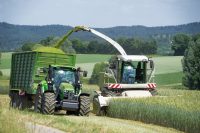COVID-19: Practical guidance for our rural and farming clients #14
Today (Wednesday 10 June) marks the final date on which an employer can furlough an employee for the first time and be eligible to claim under the Coronavirus Job Retention Scheme. More details can be found below.
Also contained in our update we provide more details on the Dairy Response Fund aimed at helping those dairy farmers experiencing significant fixed costs and animal welfare issues (the fund opens for applications on 18 June) along with updates on the Statutory Sick Pay Rebate Scheme, Local Authority Discretionary Grants Fund, Stamp Duty surcharge extension and the Trade Credit Reinsurance scheme.
We are also delighted to have on the panel for this week’s rural ‘Virtual Breakfast’ Q&A, Rural Accountant, Neil Cox and Rural Chartered Financial Planner, Julia Banwell to answer your questions. You are welcome to join us live at 9.00am on Friday 12 June.
As we move further out of COVID-19 restrictions you will, inevitably, have more questions, concerns or opportunities arising, please do not hesitate to get in contact to discuss these further.

10th June 2020
-
Andrew Vickery See profile
The CJRS scheme will close to new entrants from 30 June. From this point onwards, employers will only be able to furlough employees that they have furloughed for a full three-week period prior to 30 June.
This means that the last opportunity by which an employer needs to agree with their employee and ensure they place them on furlough is 10 June. Employers will have until 31 July to make any claims in respect of the period to 30 June.
The important timelines for CJRS are:
10 June 2020 – deadline to place employees on furlough.
1 July 2020 – scheme closes to new entrants who have recently been furloughed.
1 July 2020 onwards – employers can bring employees back to work on a part time basis who have previously been furloughed, for any amount of time and on any shift pattern. This means that employers will still be able to claim under the scheme for ‘working hours’ spent on furlough but will have to pay in full as normal for any hours actually worked.
1 August 2020 onwards – employers will have to pay employee’s national insurance contributions and pension contributions and can no longer reclaim through the scheme.
1 September 2020 onwards – the scheme will only reimburse 70% of salary (up to a maximum of £2,190). Employers are required to top-up to 80% (or more, depending on what was agreed with the employee) and will continue to also pay the employee’s national insurance and pension contributions on their salary.
1 October 2020 onwards – the scheme will only reimburse 60% of salary (up to a maximum of £1,875) and employers will continue having to top up to 80% (or more, depending on what was agreed with the employee). Employers will continue to also pay the employee’s national insurance and pension contributions on their salary.
31 October 2020 – Coronavirus Job Retention Scheme closes.
Further guidance on flexible furloughing and how employers should calculate claims will be published on 12 June.
Dairy farmers who have experienced financial difficulties meeting fixed cost of production during the coronavirus outbreak have the opportunity to claim up to £10,000 from the government Dairy Response Fund. We now know the fund will be open for applications on the 18 June and paid out from the 6 July.
To be eligible you must demonstrate that you have suffered a reduction in the average price paid for your milk of 25% or more in April 2020 when compared with February 2020. If you are eligible, the fund will cover 70% of your losses up to £10,000.
Recognising the need for the rapid processing of applications and payments, eligible farmers will be able to submit applications directly to the Rural Payments Agency (RPA).
For those qualified to make a claim, it’s expected that you will need to provide detailed evidence of your production levels for February, April and May. We advise you start preparation for this now.
Given the qualification criteria many dairy farmers will not qualify for this grant but, if you feel you have been adversely affected by COVID-19 and need financial assistance, there is other grant funding available from the government, please contact your Old Mill adviser to talk you through the options.
On 26 May the government portal for reclaims of statutory sick pay opened.
Employers with fewer than 250 employees can claim for up to two weeks of coronavirus-related Statutory Sick Pay (SSP). In order to file a claim, businesses must be registered with PAYE online and must have already paid employees’ SSP.
To qualify for Statutory Sick Pay (SSP) you must:
- be classed as an employee and have done some work for your employer
- earn an average of at least £120 per week
- have been ill, self-isolating or ‘shielding’ for at least four days in a row (including non-working days)
The National Farmers Union (NFU) note the following point with regards to SSP: The Statutory Sick Pay relief package for SMEs has been set up under the EU Temporary Framework. Therefore, the amounts claimed under this scheme will count towards the €100,000 state aid limit for agricultural businesses (or €800,000 for other businesses such as separate diversification businesses).
The government has confirmed that businesses wanting to apply for the Local Authority Discretionary Grants Fund must have ongoing fixed property-related costs, and occupy property (or part of a property) with a rateable value or annual mortgage/rent payments below £51,000. This is in addition to being based in England and trading on or before 11 March 2020.
Each district council is responsible for their own closing date so check your local council for full details and closing date.
As many of our clients are aware, through painful experience or otherwise, buyers must pay a 3% Stamp Duty Land Tax (SDLT) surcharge if they purchase a residential dwelling on completion, typically if they own more than one dwelling. Buyers can claim a refund of this additional SDLT if they buy a new property and then sell their previous main dwelling at a later date.
HMRC have now published an ‘exceptional circumstances’ update, which may help some buyers to claim the refund, if the sale of the previous main dwelling is affected by the impact of the coronavirus situation.
Under normal circumstances, in order to claim a refund of the 3% SDLT, the previous main residence must be sold within three years of buying the new property – e.g. if you bought a new house on 1 May 2017 then you would have needed to have sold your previous home (which need not be in the UK) on or before 1 May 2020 to claim the refund.
However, HMRC’s update now states that they will extend the three-year time limit where the sale of the previous home was delayed due to exceptional circumstances such as the impact of coronavirus.
Once the exceptional circumstance has ended, the previous main dwelling must be sold before HMRC will consider whether the circumstances were exceptional. It’s a question of fact and degree and each case will be considered on its own merits. There is no pre-transaction clearance facility.
This extension of the time limit only applies where the new main residence was purchased on or after 1 January 2017.
If you are selling or trying to sell your main residence, we advise you speak with your Old Mill adviser to make sure you have the optimal tax reliefs in place.
Trade Credit Insurance, which provides essential cover for business-to-business transactions will receive up to £10 billion of government guarantees.
The Trade Credit Reinsurance scheme will provide guarantees to support supply chains and help businesses during the coronavirus pandemic to trade with confidence that they will be protected if a customer defaults or delays on payment.
The scheme is available on a temporary basis for nine months, backdated to 1 April 2020 and available to insurers operating in the UK market.
Forms are now open for employers to check whether they are eligible and claim online at here.
Join us this Friday live at 9am as we welcome Rural Accountant and Director, Neil Cox, and Rural Chartered Financial Planner, Julia Banwell.

Neil and Julia will be discussing new announcements regarding COVID-19 and the business implications and opportunities for farmers and rural businesses.
You are welcome to submit questions during the event using the question box on the right of your screen or beforehand to marketing@om.uk.
Click here to join our ‘Virtual Breakfast’ this Friday 12 June at 9am.
The link will direct you to a secure Microsoft Teams page. Here you can click the box ‘watch on the web ‘which will give you entry without having to download any software.
If you have any problems accessing the event, please let us know by contacting marketing@om.uk.
For more information, or if you have any questions about any of the above, please contact your Old Mill adviser or email enquiries@om.uk.

